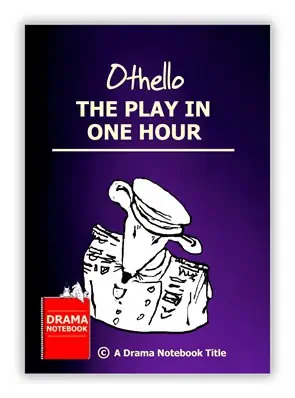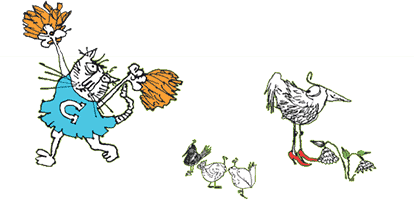OTHELLO is a tragic story of love, jealousy, and racial prejudice. Written by William Shakespeare around 1603, the story is set in motion when Othello, a heroic black general, appoints Cassio and not Iago as his chief lieutenant. Jealous of Othello’s success and envious of Cassio, Iago plots Othello’s downfall by falsely claiming that Othello’s wife Desdemona is having an affair with Cassio. These abbreviated Shakespeare adaptations are a wonderful introduction to the story and language of the Bard.
Excerpt from the Play:
CHARACTERS
Othello, the Moor of Venice — Noble General of the Venetian army; a non-European man
Iago, OTHELLO’s “honest” ensign and close confidant; the villain of our tale
Desdemona, OTHELLO’s loyal wife
Emilia, Desdemona’s attendant, and close confidant
Cassio, OTHELLO’s newly promoted Lieutenant
Roderigo, a rich and pathetic bureaucrat, conspires with Iago, in love with Desdemona
Montano, a high-ranking officer of Cyprus
Lodovico, a Venetian politician; cousin to Desdemona
Ensemble, various Guards, Soldiers, Attendants, etc. (Optional)
Act I Scene 1
Venice. A street.
(Music. A choreography begins…[Enter OTHELLO from one side; enter DESDEMONA and EMILIA from the other. Choreography: OTHELLO courts Desdemona while EMELIA stands at a distance, and after a moment, he proposes marriage; he kneels to her and reveals a handkerchief decorated with strawberries. He unfolds it to uncover a wedding ring. As he slips the ring onto her finger:]
OTHELLO
So long as men can breathe and eyes can see,
So long lives this, and this gives life to thee.
[He rises and they kiss; perhaps a short wedding dance occurs. Enter IAGO, excited — Emilia blows him a kiss and he brushes it off. Desdemona runs, elated, over to Emilia and they exit together. OTHELLO takes Iago’s hand, center stage — suddenly CASSIO rushes in; OTHELLO takes his hand as well. OTHELLO leads them downstage, to the edge of the stage — then, OTHELLO lifts Cassio’s hand above their heads, in victory; Cassio has been promoted in OTHELLO’s army. They shake hands; exit Cassio excitedly. OTHELLO turns to Iago, and embraces him; pats him on the back and exits after DESDEMONA Iago is left onstage alone for a beat, dejected.]
IAGO
I hate the Moor.
I follow him to serve my turn upon him:
I am not what I am.
His name is Othello; he is the general of our Venetian army.
He is of a “free and loving” nature… all the better to destroy him with.
Why, you ask? Our leader has just married the lovely Desdemona; the most revered and well-to-do woman in the city — happiness abounds! But not with me. For I have been skipped over, forgotten… betrayed. The noble Othello has chosen to promote Michael Cassio as his lieutenant, his right-hand man. Cassio is a “proper man” … with no more experience in the field of battle than a schoolboy! And here I am… stuck in place, in the role of the trusty “ancient” — bid to go on paltry errands. All my many years of service to the Moor thrown out a high window, like unwanted baggage! Fie on him! How dare Othello promote the the beardless Cassio to his lieutenant — the title that was supposed to be MINE! Oh, Othello… you broke my heart. And for that, you will be made to suffer. But, first thing’s first: the Duke of our city says our army must go fight the Turks at sea. And so, off we go to Cyprus, to meet up with our allies in arms!
[IAGO makes to leave–]
RODERIGO (suddenly sighing, from the audience:)
Desdemona,-
IAGO [stopping]
What say’st thou, noble heart?
RODERIGO [approaching IAGO]
What will I do, thinkest thou?
IAGO
Why, go to bed, and sleep.
RODERIGO
I will drown myself.
IAGO
If thou dost, I shall never love thee after.
Why, thou silly gentleman!
RODERIGO
It is silliness to live when to live is torment! What should I do? I confess it is my shame to be so fond of Desdemona; but it is not in my virtue to amend it.
IAGO
O, villainous Virtue! ’tis in ourselves that we are thus or thus. It is merely a lust of the blood and a permission of the will. Come, be a man. Drown thyself! drown cats and blind puppies. I have professed me thy friend and I confess me knit to thy deserving with cables of perdurable toughness; I could never better stead thee than now. Put money in thy purse; follow thou the wars; defeat thy favour with an usurped beard; I say, put money in thy purse. It cannot be that Desdemona should long continue her love to the Moor,- She must change for youth: When she is sated with his body, she will find the error of her choice: she must have change, she must — thou shalt enjoy her; therefore make money.
RODERIGO
Wilt thou be fast to my hopes, if I depend on the issue?
IAGO
Thou art sure of me:-go, make money:-I have told thee often, and I re-tell thee again and again, I hate the Moor: my cause is hearted; thine hath no less reason. Let us be conjunctive in our revenge against him: if thou canst cuckold him, thou dost thyself a pleasure, me a sport. There are many events in the womb of time which will be delivered. Traverse! go, provide thy money. We will have more of this to-morrow. Adieu.
Why Subscribe?
 Inside Drama Notebook, you will find a huge collection of well-organized lesson plans, scripts for kids, drama activities, 50 drama games on video and more! Join today and dramatically reduce your planning time while delivering fresh, innovative drama lessons to your students! If you are new to teaching drama, this site will be a Godsend! You will immediately feel confident about teaching drama like an expert. The site guides you step-by-step and provides you with materials that you can use right away with your students.
Inside Drama Notebook, you will find a huge collection of well-organized lesson plans, scripts for kids, drama activities, 50 drama games on video and more! Join today and dramatically reduce your planning time while delivering fresh, innovative drama lessons to your students! If you are new to teaching drama, this site will be a Godsend! You will immediately feel confident about teaching drama like an expert. The site guides you step-by-step and provides you with materials that you can use right away with your students.
If you have been teaching for years, Drama Notebook will inspire you with a fresh new approach and innovative ideas!
The site is packed with original, innovative lessons and activities that you will not find anywhere else—and new materials are added monthly.
This site is protected by reCAPTCHA and the Google Privacy Policy and Terms of Service apply.

















